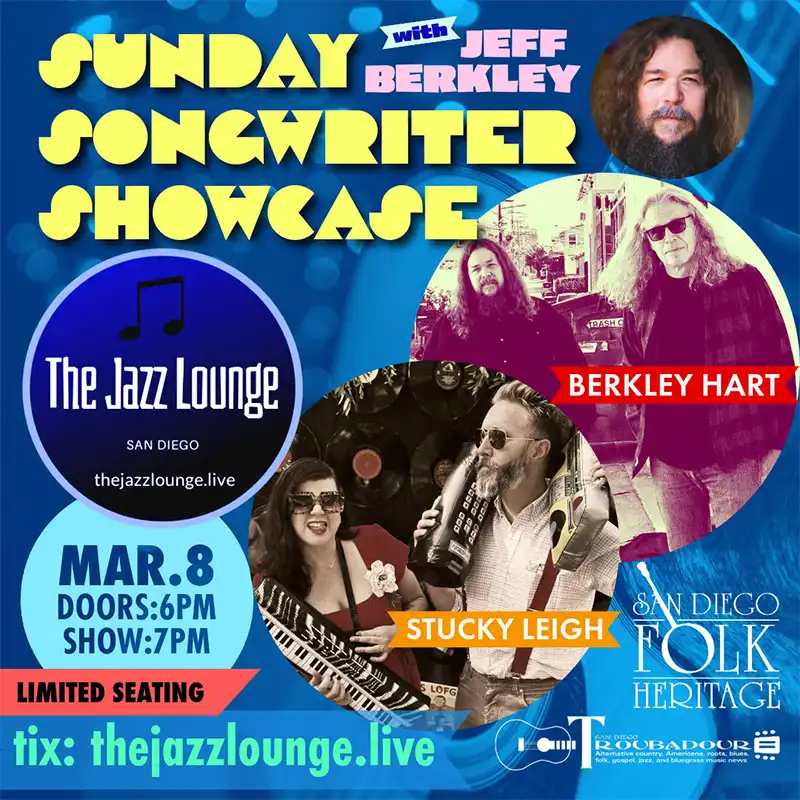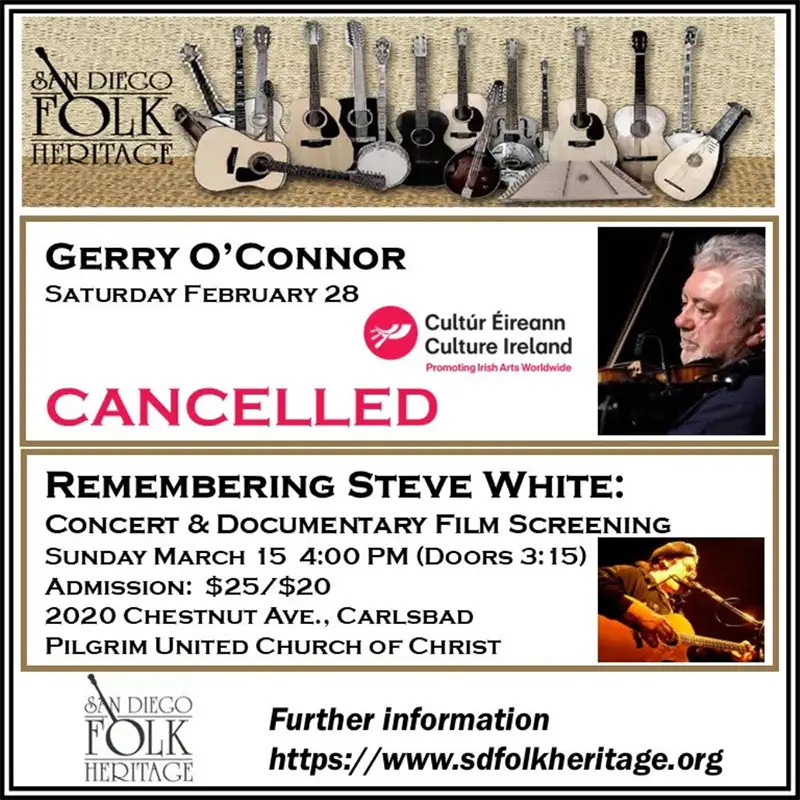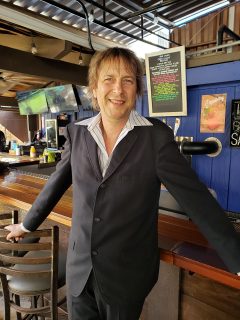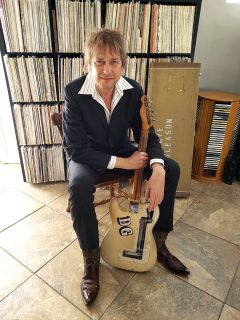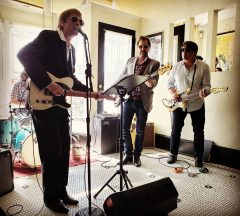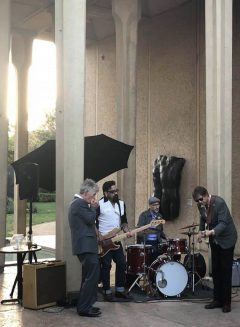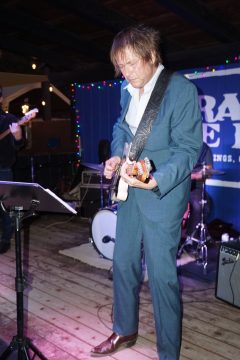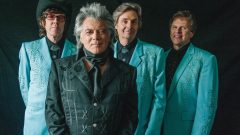Cover Story
DAVE GLEASON: It’s All About the Music
San Diego is well known for its rock and jazz scenes, but of late country music has also begun to receive a bigger share of the spotlight. While there have been plenty of great local musicians who play in the genre, it’s likely no coincidence that the current resurgence began right around the time guitarist Dave Gleason decided to call San Diego home.
Sitting in Border X Brewing’s Logan Heights patio, it’s an easy going conversation with Gleason. No beverages are consumed, but the conversation is flowing. He’s recorded several critically acclaimed albums, but it’s live, onstage where the magic happens. Indeed, it’s not unusual to see other guitarists at his shows, checking out his inspired fretwork. One of the busiest musicians in town, Gleason and his trio are seemingly everywhere, regularly heard at venues such as the Casbah to the Grand Ole BBQ—his music works in pretty much any setting. Celebrated by the likes of Guitar World magazine, Gleason is humble to a fault. He’s had an impressive life in music and sky’s the limit when it comes to what’s ahead.
He’s considered by many to be a top-notch country music guitarist. What does he consider himself? “A telecaster player,” Gleason said, “which is Steve Cropper, Roy Buchanan, Danny Gatton, and then the Buckaroos or Merle Haggard. I’m trying to grab that Johnny Winter/Freddie King era of guitar playing. I’m kind of mixing all my genres: the jazzy thing, the blues thing, and the Bakersfield country thing.”
Music is Gleason’s life. “The only thing I’ve ever done besides play music is work in a record store,” he mused. Gleason spent 12 years at Amoeba Records’ Berkley location, a dream job for any music fan.
Early Days / San Diego
Gleason was born in Milwaukee, Wisconsin in 1968, moving with his family to the San Francisco Bay Area in 1972, when he was six years old. More recently, he’s had short stays in Los Angeles and Nashville before arriving in San Diego in July 2018. “I have been doing gigs in San Diego since the 1990s and always really enjoyed it here,” Gleason said. “I also know many folks in the area. A job opportunity came up for my wife, who is from San Diego, so we packed up from Nashville and headed back to West Coast.” He hit the ground running. “Having many friends and connections in San Diego, I booked gigs as I was driving back to the West Coast from Nashville! I think I had three or four days off, then I dove straight in and have worked every week since I arrived.”
It was while in the Bay Area that the music bug first bit. “My dad played in a country band when I was a kid, six years old or so, and they used to rehearse in our garage,” Gleason recalled. “I grew up thinking that everybody’s dad played Merle Haggard covers in taverns around town. All the guys on my dad’s side of the family and my grandfather—everybody played music, but not professionally. I’m the first one to really go for it.”
Guitar was not Gleason’s first choice of musical instrument. “I started out as a drummer at five or six years old and by the time I was 12 I was playing in bands and doing a little bit of studio work,” he said. Though he recorded at Dangerous Rhythm Studio in Oakland with friend and producer Kevin Army (Green Day, the Avengers, Operation Ivy) at the board, he considers that nothing of significance emerged from those dates. “He would throw me in for weird little sessions with his pals,“ Gleason recalled. “Nothing came of it, except it was just cool for me to set up my drums in a studio.” The shift to guitar was abrupt. “While in Oakland I’d always kind of messed with guitar a little bit,” Gleason said. “I got to be in high school and I just woke up one day, gave my drum set away, and started playing guitar. I just never really thought about it again.”
He cites a number of artists who inspired his guitar playing. “When I was a kid, the Ventures were my favorite,” Gleason commented. “Later I got heavy into the Bakersfield country music, as well as its history, and it’s been uphill since then.” He names “Don Rich, James Burton, Roy Buchanan, Danny Gatton, Jim Campilongo, and Steve Cropper as favorites as well as blues players like Freddy King, Albert King, and Mike Bloomfield.
I’m With the Band
Today Gleason can be heard performing solo or with his trio (“my main Telecaster-driven outfit”) as well as the Stand Back Blues Band, but he was previously part of several other respected groups. “I played around with a few bands during my teenage years, but nothing of note,” Gleason said. “There was a Johnny Thunders phase, which a lot of bands were going through back then, so there was a bit of that in there.” His first stint in a touring band was with Mod Hammond B-3-driven combo called the Nick Rossi Set, also recording several tracks with the group. He was soon leading his own combo. “When I started doing solo records I must have been around 30, circa 2000,” he recalled. “That’s when I put a band together with John Kent and Mike Therieau of the Loved Ones, which became Dave Gleason’s Wasted Days.” The latter also spent time with the Event and Mover, while Kent was a veteran of Rossi’s band. With Wasted Days, Gleason released three albums Self Titled (2002), Midnight, California (2004), and Just Fall to Pieces (2007).
“It all came together really quick,” Gleason recalled. “We got in and did a demo and it came out well enough that we thought ‘let’s write another eight songs and put something out.’” The band ended when Gleason moved to Los Angeles the first time in 2008. “It was never like a big split or a terrible announcement or anything but I wanted to get out of the Bay Area,” Gleason said. “We never got huge; there was never an empty show and our albums sold well enough, but there was so much country rock stuff in LA where the scene was really happening, while in the Bay Area, the live music scene was dissolving because the [cost of living] prices were going insane. Meanwhile, Los Angeles had Mike Stinson and Lucinda Williams and Dwight Yoakam hanging around. There was a huge pocket of real stuff happening and I just knew that I had to get down there if I wanted to have some kind of career or input into this.”
For the Record
Gleason has a personal discography five albums deep, including the afore mentioned Wasted Days albums and rounded out by two solo releases, Acoustic Sessions (2008) and Turn and Fade (2010). Gleason has also played and recorded with Eric Shea & the High Deserters, as well as performing a fair bit of session work, including helping to write and playing on two albums with Drag City Records artists and comedian Neil Hamburger: Neil Hamburger Sings Country Winners (2008) and First of Dismay (2014).
It’s an impressive list but only touches on the possibilities with Gleason’s music. Indeed, future music historians are going to have a field day. “I’ve got a stockpile of hundreds of country songs that I wrote years ago,” he said. “And I’ve got a couple of instrumental records that could be compiled if I really sat down and did some organization.”
No new recordings are planned, but there is new music ahead. “I have a finished album, Due West, which is ‘in the can’ as they say. I cut it in Nashville with Marty Stuart’s great band the Fabulous Superlatives. It was produced by Kenny Vaughan,” he said good naturedly.
The reason for the lack of new music is pragmatic. “I can’t get a read on what the business is doing anymore, if its even worth putting something out,” Gleason said. “I’ve got a really good distribution deal that I’ve had for years and I’ve even called them and said, ‘What are people doing, what should I do?’ And they had no real answer.” All of his albums are out of print. “I’ve sold out of everything I’ve had,” he said. “I don’t play any of that old stuff anymore anyway.”
Is he a prolific writer? “When I’m in the mode of doing it, yeah,” Gleason acknowledged. He has been known to move fast. “The last record I put out, I just sat down and wrote it in a weekend. I was trying to do a Dylan Blonde on Blonde kind of experiment—just write a bunch of stuff real quick. The band I used on the recording didn’t hear any of the stuff in advance, I basically played it for them once acoustically and then we tracked.”
Despite numerous original tunes to his credit, for the moment his electric gigs are all songs by other songwriters. “Only covers right now,” Gleason said. “I’m having a lot of fun being a guitar guy, which is kind of the phase I’m in right now. When I do solo acoustic gigs I’ll do original stuff.”
Sessions
Gleason likes to keep busy, averaging ten gigs or more month. “That’s including when I sit in with various performers,” he said. “That’s fun for me to do—not run the show but just stand there and play lead guitar.” Gleason has played lead guitar for Los Angeles honky tonk singer-songwriter Mike Stinson and San Diego-based country singer J.D. Crawford, as well as “loads of guitar-for-hire gigs” with folks like Jim Lauderdale, James Intveld, Dead Rock West, Charlie Louvin, and Robert Gordon.
Has he ever considered being just a session player? “I attempted it but just never caught on. I’ve played on a lot of records, but I don’t like to learn parts at all [laughs]. I think that may have affected session work a little,” he joked. “Even the people who hire me for live gigs, I do quite a bit of lead guitar work for other country dudes and it’s down to a handful that know what they’re going to get: I’m going to play a bunch of fairly weird stuff. I’m not going to play all the parts in a straight line. I’ll play something that’s kind of cool.
“So I’ve just been a gun-for-hire guitar player for a long time but never as a full time thing,” he added. “I always tried to hang in there as a solo artist, whether it’s as a guitarist, singer, or songwriter. I prefer being a solo artist. Now that I’m in so deep I’m pretty confident in what I do. Not that I think I’m a terrific player or anything, but I like what I do, I’m totally confident in what I’m representing up there.”
Additional groups he’s toured with include the Bastard Sons of Johnny Cash and Nick 13 of the psychobilly band Tiger Army. He released a solo country record, (s/t 2011), that used studio guys, so he had to put a band together to go out on the road. “We spent three months out there and circled America a few times.”
Despite high-profile gigging he’s never toured Europe. “I’ve had a few offers that have never been good enough to drop my entire life and go over there. I’m not especially interested. I’ve been doing it too long, so it would have to be something that was financially viable. If I was to be in a touring situation it would have to be good, like John Fogerty good or Sheryl Crow, something on that level. I’m not going to jump in the van stay at the Red Roof Inn anymore. I’m so happy just being fairly relaxed around here. I barely even get up to LA to do anything anymore. And it’s great. I’m happy just making a living playing.”
While he’s not planning on touring, Gleason will be working just as hard playing local shows. “I think I’ve done the tour thing and got it out of my system,” he said. “I’m pretty satisfied, so now I’m having fun.”
New Focus
For the moment Gleason is keeping the focus primarily on his own music projects. “The sideman thing is really fun if I like the songs and I like the artist, so these days that’s why I’m keeping it to folks that I know and I know what their set is going to be like. I’ve managed to make it work. I’m a pretty easy guy to get along with, but I enjoy being the solo guy. That’s also why I like the trio thing. I started doing the trio thing and it was the ultimate freedom. Now I can really never have to rehearse [laughs].
“I feel like I’m in an odd exploration in this guitar thing that I’m doing now,” Gleason continued. “It’s pretty blues rooted but I can start to take things outside the box and start getting pretty weird.” He mentions drummer Ron Silva and bassist Tom Ward. “I’ll get these guys going on these ten-minute extravaganzas on “Caravan” or something like that, which are out there. I guess I’m leaning more in to a player like Bill Frisell, which is not like a jazz guy because I can’t do all the jazzy chording, but I can make up my own [laughs]. There are avant garde-based things with a lot of harmonics and bends behind the nut on the guitar.”
Gleason notes that he prefers a particular type of gig these days. “Unless it’s, for example, a Tim Mays thing and a good opening slot, like the Junior Brown gig at the Casbah last year (March 1, 2019). I like doing the two or three sets a night type of gig,” Gleason remarked. “That’s why to me the Grand Ole BBQ,, Panama 66, or the Riviera Supper Club are perfect, because I can just set up and play. I prefer playing from 9pm to1am where I can take off on my little tangents as opposed to getting a 45-minute set together. That drives me insane at this point. I like to have the evening wide open.”
Playing with the Stand Back Blues Band allows Gleason to stretch out even more. “I played a gig with the Bedbreakers at the Casbah and really enjoyed what they did,” he said. “I just wanted to meet some of the guys into the same blues stuff that I am, so I kept in touch with those guys. It turns out to James Bowman [drums] also went to school with my wife, so that was a quick inroad. Anyway, I ran into James at a show somewhere and he mentioned that his band had broken up. So I quickly asked if he wanted to do a Paul Butterfield-Loved Ones kind of thing. He just said he’d ask the guys. Five minutes later everyone was in. We came up with a set list of 30 of our favorite Mod-blues favorites, like Little Walter, Howlin’ Wolf, and so on. Dirty harmonica-driven Chicago blues, like Paul Butterfield or the Loved Ones, which I don’t think anyone in town is doing right now, and if they are I’d like to meet them. I’ve been trying to get us on the Gator by the Bay Fest, but nothing yet. This is the real serious blues stuff—it’s gone over pretty well and it’s a pretty steady gig now; we play a couple of times a month.”
How much prep does he do for a show? “Zero,” Gleason said. “I haven’t rehearsed a band in literally 10 or 12 years.” His drummers and bassists can vary depending on musician availability, which makes the right player choice crucial. “I like to pair certain players together when I can,” he said, mentioning Ron Silva (drums) and Tom Ward (bass), with Bowman and Ruben Ramos (bass) amongst his favorite area players. What are his expectations for the musicians at his gigs? “Everybody I hire for shows always gets paid and they’re always people that I know can handle it. I’ve known Tom since the ’80s and I know that he can pretty much play anything.”
What are some of the crowd pleasers? “When I play solo, it’s solid Bakersfield stuff and I’ll do originals. But with the trio it’s different. I’m starting to attract the guitar guys,” he said. “I can see the tables of guitar guys out there [laughs]. Like there’s a bunch of Taylor Guitars guys that show up and I like that.” He points out that for his electric sets at locations like the Riviera Supper Club or the Grand Ole BBQ, Chuck Berry and similar danceable rhythms are amongst the most popular dance floor fillers. “I always have a few Roy Buchanan songs and any of Freddie King’s uptempo stuff that people always really enjoy. I always throw in a couple of Buck Owens songs as well. Uptempo blues like Howlin’ Wolf or Little Walter, that kind of stuff is good for the dancers. I have an instrumental version of “Folsom Prison Blues,” a great way to kill five minutes and everybody’s dancing. Danceable songs by NRBQ,, the Band, Dylan, and especially Chuck Berry—people just respond to that, all ages.”
Due West
While Gleason is concentrating on local gigging, the album with the Fabulous Superlatives, Due West, is still on the back burner, with a hoped-for release sooner rather than later. “When I first moved to Nashville, a young man who was kind of managing Kenny Vaughan introduced us,” Gleason recalled. “We became really quick friends. Basically me and Kenny walked up to each other and we both had glasses on and suits and weighed about 150 pounds. I gave him a copy of one of my records that night and he called me the next morning.” The two soon began gigging around Nashville. “We probably played together ten times, whenever he was in town or available.” As for recording, “I just brought it up after a gig one night, I said “Hey, what would you think about producing a record, I have loads of songs and he said, “I’d Love to.” So we set up some studio time with his buddy, who owns Jim Reeves’ old house and has a studio in the basement.”
Taking things to the next level, Vaughan “roped in the Fabulous Superlatives. And I paid them all; it was a legit business deal and they weren’t buddy buddy who came and did it for free.” Gleason is pleased with the results. “Their level of musicianship is so ‘professional Nashville’—and you can hear it in the first two seconds. It was another situation where I went through the songs with those guys one time on acoustic and then we basically tracked everything live. I had the whole band in the studio two days to track 14 songs. Those guys watched me sit there and play these tunes and were all just taking their notes. They didn’t have anything to say, no suggestions. It was just ‘oh great, let’s just do it.’ It’s pretty much all first takes with these guys. There are great players everywhere but these guys are stunning. It was amazing how much they were paying attention and what nice guys they were. It was just like a fifth gear focus ‘this what we do every day,’ and it was neat to get thrown into that. But it also made me realize that I really better have it together—no showing up with a bottle of wine to these sessions [laughs].”
Hopefully fans won’t have to wait too long for Due West’s release. “It’s an important record to have those guys on it,” Gleason said. “I don’t want to put it out just digitally and have it downloaded 200 times and then disappear because no one knows anything about it.” He is looking for the whole deal, vinyl, PR, and all that. “I don’t want to waste that record, have it get lost in the shuffle. I did a record with a lot of heavy hitters, so it’s probably the last chance I’ll get to do that,” Gleason said.
Gear
Surprisingly for a top lead player, Gleason doesn’t have a lot of instruments. “I’m not a gear guy at all,” he said. “I go into a guitar store about every two years. I have a small handful of guitars and amps and I am very happy to keep it that way! I have a couple Fender Telecasters, complete with Parsons-White B-Benders, a Fender Deluxe Reverb amp, and a Fender Princeton amp as well as a couple of Martin D-28 acoustic guitars. That’s It. I use zero effects pedals—I plug straight in, always have.”
His lack of collector mentality extends to his own output. No press clippings or memorabilia clutter the home. “No I don’t own a copy of anything,” Gleason said. “I kind of just get it done and move on. I ran out of all my merch and CDs and I even sold my own personal copies off my shelf. I have the songs digitally on my computer if I need to send someone a copy, but that’s about it.”
Modern Times
What’s next for Dave Gleason? More of the same—more shows, more sessions, more playing. Can he see himself doing this 20 years from now? “Oh sure, definitely so, especially the stuff I’m doing now. It’s not loungy, but I can definitely get pretty Wes Montgomery/Kenny Burrell if I want to—I can kill three hours with just kind of quiet Blue Note-sounding stuff and that sounds fun to me.” It’s clear that Gleason is happy with his life as a performer. “Being a musician is about all I’ve done and all I can do! I’m just hoping that people still enjoy a guy still standing up there and playing guitar and taking chances.” He’s disarmingly modest about what he does. “Just hopefully onward and upward is about it,” Gleason said of future endeavors. “I like the places I play a lot, the crowds are always good, and I seemed to be getting through to folks. I just kind of like doing what I do.” Indeed, while accolades and more gigs are always welcome, Gleason simply likes making music. “I’m looking for no pat on the back,” he mused. “It’s fun to just get the gear out of my house and go play,” Gleason said.
www.dave-gleason.com
n




